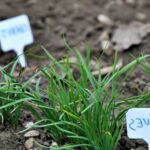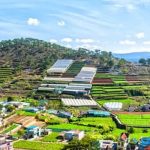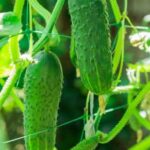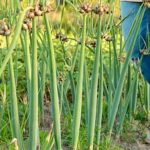Fresh, clean water is the lifeblood of any thriving garden, especially when it comes to growing vegetables. One increasingly popular method for ensuring a sustainable and reliable water supply is the use of rain barrels. By collecting and utilizing rain barrel water, gardeners can unlock a myriad of benefits that can lead to healthier plants, cost savings, and a lighter environmental footprint.
When it rains, precious water cascades off rooftops, sidewalks, and streets before eventually finding its way into storm drains. But what if we could capture this free resource and put it to good use? That’s where rain barrels come in.
These simple yet ingenious devices are designed to collect rainwater from downspouts or gutters and store it for later use. By intercepting runoff before it reaches drains or seeps into the ground, rain barrels not only conserve water but also help reduce urban flooding.
The advantages of using rain barrel water specifically for vegetable gardens are many-fold. Firstly, rainwater is naturally pure and devoid of chemicals typically found in tap water such as chlorine or fluoride. This means that vegetables grown with rain barrel water are not subjected to chemical contaminants that could affect their taste or nutritional value.
Additionally, relying on collected rainwater can significantly lower monthly water bills for gardeners while simultaneously easing the strain on municipal water supplies during peak irrigation seasons. And let’s not forget about the environmental benefits – by utilizing rain barrel water instead of tap water, gardeners contribute to reducing the reliance on energy-intensive treatment processes used to make tap water safe for consumption.
In an era where sustainable practices are more important than ever, incorporating the use of rain barrel water into our vegetable gardens is a small but impactful step towards greater self-reliance and reduced environmental impact. In the following sections, we will delve deeper into what a rain barrel is and how rainwater is collected using one.
We will explore the myriad advantages of using rain barrel water for vegetable gardens, as well as provide step-by-step instructions on preparing and utilizing this natural resource.
Additionally, we will showcase successful case studies and address potential challenges gardeners may face along the way. So let’s dive in and discover how rain barrel water can transform our vegetable gardens into thriving, sustainable oases.
What is a Rain Barrel
A rain barrel is a container used to collect and store rainwater. It is designed to capture water from rooftops, diverting it into the barrel where it can be stored for later use. Rain barrels are an essential tool in water conservation efforts, as they help reduce the amount of freshwater that is wasted or lost through runoff.
Definition and Purpose of Rain Barrels
A rain barrel is typically made from plastic, although other materials such as metal or wood may also be used. It has a capacity of around 50 to 100 gallons, depending on its size. The barrel usually comes equipped with a spigot or valve at the bottom for easy access to the collected water.
The purpose of a rain barrel is twofold: to conserve water and to reduce stormwater runoff. By collecting rainwater from rooftops, rain barrels prevent excessive runoff that can lead to erosion and flooding. This helps protect natural waterways and reduces strain on municipal stormwater systems.
Benefits of Using Rain Barrels
Using a rain barrel offers several benefits for both gardeners and the environment. Firstly, it provides a sustainable source of water for vegetable gardens without relying solely on freshwater supplies. This can be especially beneficial during dry periods or in regions with limited access to clean water.
Secondly, rain barrel water is free from chemicals such as chlorine that are often found in tap water. This makes it an ideal option for watering vegetable plants, as it eliminates any potential harm caused by these chemicals.
Additionally, using rain barrel water helps reduce the demand for municipally treated water, which requires energy-intensive processes such as purification and transportation. By conserving freshwater resources, we can lower our carbon footprint and contribute to overall environmental sustainability.
In summary, a rain barrel serves as an effective tool for collecting and storing rainwater, providing numerous benefits both for vegetable gardens and the environment at large. By understanding the purpose and advantages of rain barrels, gardeners can make informed decisions regarding water conservation and sustainable gardening practices.
How Rain Barrel Water is Collected
Rain barrel water collection is a simple and effective way to conserve water for your vegetable garden. Rain barrels are specifically designed containers that capture rainwater from rooftops, preventing it from running off into storm drains or being wasted. These barrels can be easily installed and maintained, making them an accessible option for any gardener.
To collect rainwater using a rain barrel, first choose a suitable location near a downspout or gutter system. Place the rain barrel underneath the downspout so that it can catch the water as it flows from the roof. It’s important to ensure that the barrel is stable and level to prevent any accidents or water overflow.
Installation tips include adding a debris screen on top of the barrel to prevent leaves and other particles from entering the water collection area. This will help keep your harvested rainwater clean and free of debris. Additionally, consider elevating your rain barrel on cinder blocks or another sturdy platform to allow for easy access when drawing water.
Regular maintenance is crucial to ensure optimal functioning of your rain barrel system. Clean out the debris screen regularly, especially during heavy rainfall periods when more debris may accumulate. Inspect for any leaks or cracks in the barrel and make necessary repairs as needed. If temperatures drop below freezing in your area, remember to properly winterize your rain barrel by draining all remaining water beforehand.
By collecting rainwater in a rain barrel, you not only reduce demand on municipal water supplies but also save money on your utility bills. It’s estimated that one inch of rainfall on an average-sized roof can yield up to 600 gallons of water, which is plenty for irrigating your vegetable garden during dry spells. Plus, utilizing naturally collected rainwater eliminates exposure to harsh chemicals found in tap water that could potentially hinder plant growth.
Advantages of Using Rain Barrel Water for Vegetable Gardens
Using rain barrel water for vegetable gardens offers a multitude of advantages that can enhance the growth and overall health of the plants. The natural composition of rain barrel water makes it particularly beneficial for vegetable gardens. Unlike tap water, which often contains chlorine or fluoride, rain barrel water is free from these chemicals and other additives that may hinder plant growth. This natural composition provides vegetables with pure and clean water, allowing them to absorb essential nutrients more effectively.
Additionally, using rain barrel water can be highly cost-effective. By collecting and utilizing rainwater, gardeners can significantly reduce their reliance on municipal water supplies, ultimately lowering their monthly utility bills. Rainwater is essentially free, making it an affordable alternative to traditional watering methods. This is especially advantageous for gardeners who live in areas with limited access to clean or affordable water sources.
Moreover, utilizing rain barrel water for vegetable gardens has significant environmental benefits. Rainwater harvesting helps conserve precious freshwater resources by reducing the burden on local water supplies. By collecting excess rainfall which would otherwise run off into storm drains, gardeners can actively contribute towards sustainable gardening practices. This not only conserves water but also prevents soil erosion and reduces the risk of flooding in urban areas.
Using rain barrel water for vegetable gardens undeniably presents numerous advantages, with its natural composition, cost-effectiveness, and positive environmental impact being at the forefront. By harnessing this readily available resource efficiently, gardeners can promote healthy plant growth while contributing towards a more sustainable future.
Preparing Rain Barrel Water for Vegetable Gardens
Preparing Rain Barrel Water for Vegetable Gardens
Properly preparing rain barrel water for vegetable gardens is essential to ensure the health and success of your plants. While rainwater is natural and beneficial, it can still contain impurities that may harm your vegetables. By following some simple steps and employing effective filtration techniques, you can make sure that the rain barrel water you use is safe and optimal for your vegetable garden.
Step 1: Clean the Rain Barrel
Before collecting rainwater, it is crucial to clean your rain barrel thoroughly. Start by emptying any remaining water from the barrel and then scrubbing the inside to remove dirt or algae buildup. Rinse the barrel several times with clean water until it is completely free of debris.
Step 2: Install a Filter System
To further ensure the cleanliness of the collected rainwater, install a filter system in your rain barrel. There are various types of filters available on the market, such as mesh screens or charcoal filters. These filters will help remove large particles, pollutants, and contaminants from the water.
Step 3: Add Mosquito Deterrents
Mosquitoes can breed in standing water, including in rain barrels. To prevent mosquito infestations, add mosquito deterrents to your rain barrel. One effective method is to place a thin layer of cooking oil on top of the water surface to suffocate mosquito larvae. Another option is to use commercially available biological mosquito control products that target larvae specifically.
Step 4: Test and Adjust pH Levels
Rainwater might have an imbalanced pH level due to atmospheric emissions or nearby pollution sources. It’s important to test the pH level of your collected rain barrel water before using it on your vegetable garden. You can purchase pH testing kits from gardening supply stores or online. If necessary, adjust the pH level by adding lime to raise pH or sulfur if you need to lower it.
By following these steps for preparing rain barrel water, you can ensure that the water is safe and beneficial for your vegetable garden. Filtering out impurities and adjusting the pH levels will go a long way in providing your plants with the best possible growing conditions. With properly prepared rain barrel water, you can be confident that your vegetables will thrive in a sustainable and eco-friendly manner.
Best Practices for Using Rain Barrel Water
Irrigation Schedules
When it comes to using rain barrel water for vegetable gardens, timing is everything. It is essential to establish a regular irrigation schedule that aligns with the specific needs of your plants.
One of the best practices for utilizing rain barrel water effectively is to water your vegetable garden in the early morning or late evening when temperatures are cooler and evaporation rates are lower. This ensures that your plants have enough time to absorb the water before the sun intensifies.
Watering Techniques
Proper watering techniques play a crucial role in maximizing the benefits of rain barrel water for vegetable gardens. Rather than splashing water on top of leaves, aim for an even distribution of water directly to the root zones. This can be achieved by using a drip irrigation system, soaker hoses, or a watering can with fine holes. By delivering water directly to the roots, you minimize moisture loss and decrease the risk of diseases caused by wet foliage.
It is also important to avoid overwatering, as excessive moisture can lead to root rot and other issues. Monitor moisture levels in your soil by sticking your finger about an inch deep into the ground. If it feels dry at this depth, it’s time to water your plants using rain barrel water.
Proper Storage
To ensure that your rain barrel water remains clean and suitable for use in vegetable gardens, proper storage is essential. Position your rain barrel on a stable and level surface away from direct sunlight to prevent algae growth and temperature fluctuations. Install a fine mesh screen or cover over the opening of the barrel to keep debris such as leaves or insects out.
Regularly inspect and clean your rain barrel to remove any sediment buildup or organic matter that may accumulate over time. In addition, check for any leaks or cracks that could compromise its function. By properly maintaining and storing your rain barrel, you can guarantee a steady supply of clean water for your vegetable garden throughout the growing season.
By following these best practices for using rain barrel water, you can ensure that your vegetable garden thrives while conserving water and reducing your environmental impact. Implementing these tips and techniques will not only benefit your plants but also contribute to a more sustainable and eco-friendly gardening approach.
Case Studies of Successful Vegetable Gardens That Use Rain Barrel Water
One of the most convincing ways to encourage others to use rain barrel water for their vegetable gardens is by sharing real-life success stories. These case studies highlight the experiences and results of gardeners who have implemented rain barrel water systems in their vegetable gardens, showcasing how this sustainable practice can lead to thriving and bountiful harvests.
In a study conducted by the Sustainable Gardening Institute, a community garden in a suburban area demonstrated remarkable improvements in plant growth and productivity after integrating rain barrels into their irrigation system. With the help of four 45-gallon rain barrels placed strategically around the garden, they were able to collect runoff from neighboring roofs during rainfall events.
This stored rainwater not only reduced their reliance on municipal water but also provided an ample supply of pure, nutrient-rich water for their vegetable plants.
Testimonies from individual gardeners further emphasize the benefits of using rain barrel water for vegetable gardens. Julie Thompson, an avid gardener from California, shared her experience using a rain barrel system in her backyard. She stated that “since incorporating rain barrel watering into my routine, my vegetables have become more vibrant and flavorful. I’ve noticed a significant decrease in disease and pest issues as well”.
To provide additional evidence, research conducted by The University of Sustainable Agriculture examined multiple test plots where vegetables were cultivated using different irrigation methods. The plot irrigated solely with collected rainwater consistently outperformed others irrigated with tap or well water regarding size, quality, and taste of produce.
These case studies demonstrate that utilizing rain barrel water can lead to healthier and more productive vegetable gardens while reducing reliance on municipal water sources. Real-life examples like these inspire other gardeners to explore the practice themselves and take advantage of the numerous benefits it offers.
| Case Study | Gardener | Results |
|---|---|---|
| Sustainable Gardening Institute Study | Community Garden in Suburban Area | Significant improvements in plant growth and productivity after incorporating rain barrels into the irrigation system. |
| Julie Thompson Testimony | Avid Gardener from California | Vibrant, flavorful vegetables with decreased disease and pest issues. |
Potential Challenges and Solutions
One of the potential challenges that gardeners may face when using rain barrel water for their vegetable gardens is the presence of contaminants in the collected water. While rainwater is generally considered to be clean, it can pick up pollutants from various sources such as air pollution, bird droppings, and roof materials. These contaminants can negatively affect the health and growth of the vegetables.
To address this challenge, it is important to properly filter rain barrel water before using it on vegetable plants. A simple and effective filtration technique is to use a fine mesh screen or a nylon stocking to cover the opening of the rain barrel.
This will help remove larger debris and particles from entering the barrel. Additionally, installing a more advanced filtration system or using a commercially available water purifier can further ensure that any remaining contaminants are removed from the water.
Another common concern when using rain barrel water is limited storage capacity. Rain barrels typically have a fixed storage capacity, which means there may not be enough water available during periods of low rainfall or drought. To overcome this challenge, gardeners can consider implementing multiple rainwater collection systems or connecting multiple rain barrels together using overflow hoses. This will help increase storage capacity and ensure a steady supply of water for vegetable plants even during drier periods.
Dealing with droughts can also pose a challenge for gardeners who rely on rain barrel water for their vegetable gardens. During extended periods without rainfall, the stored rainwater may deplete quickly and might not be sufficient to meet the watering needs of thirsty vegetable plants. In such situations, it is important to prioritize watering based on plant requirements and stage of growth.
Directing more water towards young seedlings and established plants that are flowering or fruiting will help ensure optimal growth and production. It may also be necessary to supplement rain barrel water with other sources such as municipal tap water or well water if available.
By addressing these potential challenges associated with using rain barrel water for vegetable gardens, gardeners can effectively overcome them and continue to enjoy the numerous benefits of utilizing this sustainable water source. With proper filtration techniques, adequate storage capacity, and appropriate watering practices during droughts, rain barrel water can play a crucial role in supporting healthy and thriving vegetable plants.
Conclusion
In conclusion, utilizing rain barrel water for vegetable gardens offers numerous benefits and is a key practice in sustainable gardening. By collecting rainfall and using it to nourish your plants, you not only reduce your reliance on municipal water sources but also conserve water and save money on utility bills. The natural composition of rain barrel water provides essential nutrients and minerals that contribute to the overall health and productivity of your vegetable garden.
Furthermore, using rain barrel water is an environmentally-friendly choice as it reduces stormwater runoff, which can carry pollutants into natural water sources. By implementing rainwater collection systems, you actively contribute to the preservation of local ecosystems and help mitigate the impacts of droughts by having a backup supply during dry periods.
To maximize the benefits of rain barrel water, it is crucial to properly prepare the collected water before using it on your vegetables. This includes ensuring proper filtration techniques to remove any debris or contaminants that may be present in the rainwater. Additionally, storing the harvested water in clean containers and following recommended watering practices will ensure optimal results for your vegetable garden.
In closing, by adopting the use of rain barrel water for your vegetable gardens, you not only enjoy cost savings and environmental advantages but also play a part in establishing sustainable gardening practices. As an individual gardener, taking action towards conserving water resources through rainwater harvesting contributes to a collective effort in protecting our planet’s precious resources.
So why not make a positive impact today by investing in a rain barrel system and reaping the rewards of lush, healthy vegetables while making a difference?
Frequently Asked Questions
Is rain barrel water safe for vegetable garden?
Rain barrel water is generally safe for a vegetable garden, but there are some considerations to keep in mind. First, the cleanliness of the rain barrel is important – it should be properly maintained and free from any contaminants. Second, it’s important to avoid using rainwater that has been collected from roofs treated with chemicals or surfaces that may have bird droppings or other pollutants.
Additionally, rain barrel water should not be used on vegetables that are consumed raw, as there may still be some potential for contamination from environmental factors. Overall, while rain barrel water can be a great resource for watering vegetable gardens, it’s crucial to ensure its quality and take appropriate precautions.
Is rain water better for vegetable garden?
Rainwater is often considered better for a vegetable garden compared to tap water due to several reasons. First, rainwater is typically free from chemicals commonly found in tap water like chlorine or fluoride, which can potentially harm plants over time. Moreover, rainwater tends to have a slightly acidic pH level which can benefit certain plants that prefer more acidic soil conditions.
Rainwater also contains natural minerals and nutrients that can promote healthier plant growth. Finally, using rainwater reduces the strain on municipal water resources and helps conserve water overall.
Can I use rain water for my garden?
Yes, you can definitely use rainwater for your garden! In fact, many gardeners prefer using rainwater over tap water as it offers several advantages. To collect rainwater, you can position barrels or containers strategically under downspouts or gutters to catch runoff from your roof during rainfall events.
This way you’ll have a readily available supply of natural and chemical-free water for your garden whenever you need it. Just keep in mind the same considerations as mentioned earlier – ensure cleanliness of collection containers and avoid using any potentially contaminated runoff water for edible crops if you’re uncertain about its quality. By utilizing rainwater in your garden, you’ll not only nourish your plants but also contribute towards sustainable gardening practices by conserving water resources.

If you’re looking to get into vegetable gardening, or are just looking for some tips on how to make your current garden better, then you’ve come to the right place! My name is Ethel and I have been gardening for years. In this blog, I’m going to share with you some of my best tips on how to create a successful vegetable garden.





